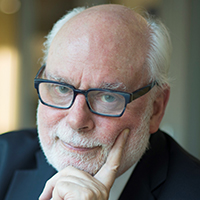
Sir J. Fraser Stoddart, Northwestern University
Artificial Molecular Machines Going from Solution to Surfaces
In 2010, we discovered an example of radically enhanced molecular recognition, which represents a valuable tool for the design and synthesis of artificial molecular pumps (AMPs) and artificial molecular motors. In this lecture, Stoddart will describe how this breakthrough has led to the fabrication of (1) two AMPs, (2) a dual and a duet pump, (3) a precise polyrotaxane synthesizer, which can be produced by attaching an AMP – call it a pumping cassette – to each end of a polymeric connecting chain, and (4) mechanisorption, which results from non-equilibrium pumping to form mechanical bonds between adsorbents and adsorbates. This active mode of adsorption has been realized on surfaces of metal-organic frameworks (MOFs) grafted with arrays of molecular pumps. Adsorbates are transported from one well-defined compartment – the bulk – to another well-defined compartment – the interface – thereby creating large potential gradients in the form of chemical capacitors wherein energy is stored in metastable states.
All these molecular pumps operate away-from-equilibrium, using energy ratchet mechanisms, in the presence of fuels and in environments that are dominated by Brownian motion. It is possible, in principle, to generate highly engineered polyrotaxanes with palindromic arrays of co-constitutionally heterotopic rings positioned on constitutionally symmetrical polymer dumbbells and then, ultimately, transcribe their programmed information back into the domain of sequence-controlled polymer synthesis. Mechanisorption extends the scope and potential of adsorption phenomena and interfaces. If materials scientists can incorporate mechanisorption into other active structures, the storage of gases like hydrogen, carbon dioxide and methane will enter a whole new world.